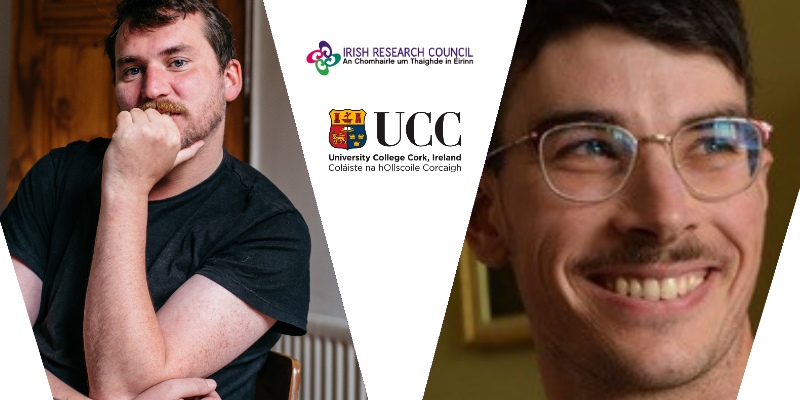UCC academics awarded two Medals of Excellence at Researcher of the Year Awards

Researchers from University College Cork have been presented with two of the four Medals of Excellence handed out at this year’s Irish Research Council ‘Researchers of the Year’ awards, announced today.
Every year, the Council presents four ‘Medals of Excellence’ to early-career researchers. Each of the 'Medals of Excellence' have been named after previous Chairs of the Irish Research Council, and recognise excellence in the 2020 postgraduate and postdoctoral funding calls run by the Council in science, technology, engineering and mathematics (STEM) and the arts, humanities and social sciences (AHSS).
Shane Somers was awarded the ‘Jane Grimson Medal of Excellence’ for the top-ranked postgraduate researcher in the STEM category. Mr Somer’s research seeks to determine the drivers of variation in the gut microbiome of a wild bird, the great tit.
Dr. Edward Molloy was awarded the ‘Maurice J Bric Medal of Excellence’ for being the top-ranked postdoctoral researcher in the AHSS category. Dr. Molloy’s research explores the nature and form of Irish separatism and the ideas that informed radical Irish nationalism in the long nineteenth century.
Mr Somers research seeks to determine the drivers of variation in the gut microbiome of the great tit. His research so far has linked gut diversity (or the number of bacteria in the gut) to weight gain in nestlings (baby birds still in the nest). Weight is a key trait in dictating which nestlings survive. Heavier nestlings are generally healthier and more likely to survive the difficult first days and weeks of independence. This study also identified individual bacterial species which were linked to nestling survival. His follow up experiments aim to show a causal link between some of these bacteria and the birds survival by separately culturing the bacteria in a lab and adding this to the nestling birds diet and then tracking their survival outcomes.
Mr Somers said:
“The microbiome consists of all the micro-organisms (bacteria, fungi etc.) of a particular environment. The gut microbiome is of particular interest because it appears to interact with the host (the owner of the gut) a lot, obviously nutrition is an important aspect of this but behaviour is another trait that is affected by the microbiome. Other researchers in UCC have linked the gut microbiome to depression and there appears to be an important link with anxiety. My research group has been investigating cognition and personality in great tits (a wild ‘model’ organism) for the last few years and we have recently expanded this to include the gut microbiome.”
Mr. Somers also noted that the book ‘I Contain Multitudes’ by science writer Ed Yong is perhaps the best pop-science book he ever read, and influenced his career.
“It opened my eyes to the potential of microbiome research and the kind of brave new world it represented, where an individual isn’t simply a collection of organs but an ecosystem in and of itself….The potential for microbes to affect the brain and behaviour is really fascinating and the opportunity to make a mark on the field at this early stage is very exciting.”
Dr. Edward Molloy was awarded the ‘Maurice J Bric Medal of Excellence’ for the top-ranked postdoctoral researcher in the Arts Humanities and Social Science category.
Dr. Molloy’s research explores the nature and form of Irish separatism and the ideas that informed radical Irish nationalism in the ‘long nineteenth century’ of approximately 1789 through 1914. A key part of his research is reading the works of prominent Irish nationalists to excavate the justifications that they use for their assertions of the right of Ireland to be independent of Britain. Dr Molloy also looks at the memoirs, novels, newspapers, pamphlets and plays produced by the nationalist movement from the 1790s to 1916.
According to Dr. Molloy, two types of argument for Irish independence can be discerned. One is based on a language of rights largely inherited from liberal revolutionary traditions from Ireland, England, America and France. These arguments usually follow from the idea that people are imbued with natural rights that entitle them as individuals to political equality and access to democratic representation, against claims that there is any basis for inherited power or privilege.
The other major type of argument used in this period is one based on the idea that Ireland exists as an historical entity and that this is the basis of its independent existence. This relies not on a claim to individual rights, but rather that the historic right of nations to govern themselves is the basis of the moral and political order. The central aim of this project is to demonstrate how the different iterations of advanced nationalist movements in Ireland during the long nineteenth century perform a modulation between these two poles of argumentation.
Commenting on what attracted him to his areas of specialism, Dr. Molloy said:
“The question of the ideological composition of separatist nationalism is something that has concerned me for most of my life. I grew up in Belfast and Tyrone in the latter years of the conflict in the North of Ireland and the ideological shifts and fissures within nationalism over those years always held an immediate and abiding interest for me. Although I went to Britain for my undergraduate and postgraduate studies, I followed these shifts closely throughout the years. In many ways, my studies were an extension of that early impetus to try to understand the motivations and ideological roots of present political events.”
Professor Anita R. Maguire, UCC Vice President for Research & Innovation, welcomed the awarding of the medals:
“We are delighted to see the award of the Irish Research Council Medals of Excellence to Shane Somers and Edward Molloy highlighting the excellence of their research in their fields – the Irish Research Council has a very strong tradition of supporting the brightest and best young minds at an early career stage. The awards to both Shane and Edward augur well for exciting future research careers.”
